'Dhoni was the captain and everyone else was battling for the second wicket-keeper's slot.'
'I was fighting with myself, always thinking of improving my game, getting better personally, not comparing myself with anyone else.'
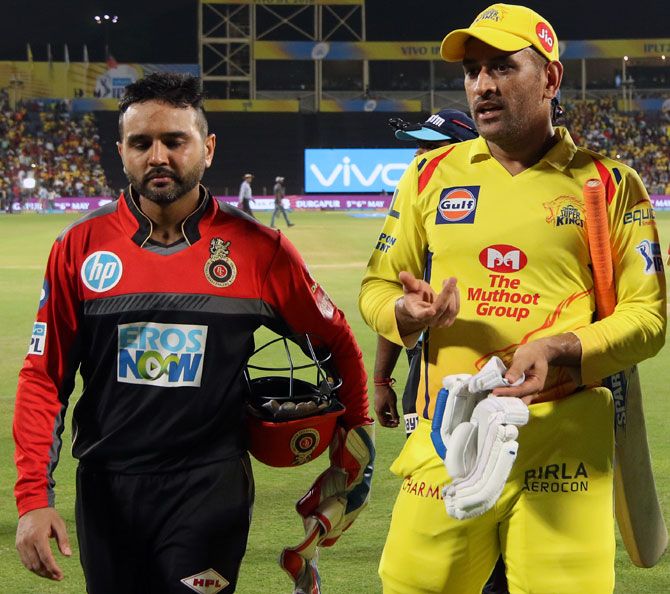
Parthiv Patel was Test cricket's youngest wicket-keeper when he debuted as a 17 year old during the Nottingham Test against England in 2002.
The chubby-faced lad looked as if he was picked straight out of school to play amongst men.
But the youngster showed he belonged to that level when he displayed exceptional resolve and battled it out for nearly an hour-and-a-half against England's pace attack to help India escape with a draw.
Fast-tracked into the Indian team even before he played Ranji Trophy cricket, Parthiv held his place for nearly two years before a poor showing with the gloves coinciding with Mahendra Singh Dhoni's arrival saw him relegated to the sidelines.
In the years that he spent away from the team, he took his batting to another level and forced his way back purely as a batsman.
After losing his place in 2004, he had to wait for four years before regaining the India call-up when he played in the Colombo Test against Sri Lanka in 2008 before enduring another long wait of eight years and playing three Tests in the home series against England in 2016.
In ODIs too, Parthiv earned a comeback in 2010, after a wait of six years, as he made it as the specialist opener in the Dhoni-led team.
In the T20 format too, he was not far behind as he emerged as an impactful opener in IPL cricket, playing for teams like Chennai Super Kings, Mumbai Indians and Royal Challengers Bangalore among others.
He also made his mark in domestic cricket, guiding Gujarat to its maiden Ranji Trophy title in 2016-2017, beating powerhouse Mumbai in the final.
Under his leadership, Gujarat became the first team to win all three major domestic titles -- Ranji Trophy, Vijay Hazare Trophy one-day tournament and Mushtaq Ali Trophy T20 tournament.
Currently honing his fitness skills by training in his gymnasium inside his home, Parthiv spoke to Rediff.com's Harish Kotian, recalling India's historic triumphs in the Test and ODI series in Pakistan in 2004, his special relationship with then India coach John Wright and how his axing after Dhoni's arrival spurred him to take his game to another level. The first of a multi-part interview:
You came into the team aged 17 and become Test cricket's youngest wicket-keeper during the Nottingham Test in August 2002 when you played alongside some of the biggest names in Indian cricket.
Do you remember that moment from nearly two decades ago when you walked out for the first time in Test cricket? Were you nervous or beaming with confidence?
Obviously, I was full of confidence; there is no doubt about it.
But you are nervous when you are playing for India because that is the reason why we all start playing cricket.
I feel honoured that I could play for India at the age of 17.
I remember the moment when Sourav Ganguly presented me the India cap; that is a moment you can't forget for the rest of your life.
I remember walking out to the middle for the first time.
We batted first and I got out for zero. I still remember walking out for the first time to bat for India.
That was special and I didn't realise it on Day 1 because I had nothing to do on Day 1, but when I got back to the room and I got so many messages on the phone, that is when I realised that I have achieved the dream of playing Test cricket.
It was a great feeling, to play my part in helping the team draw the Test. Sachin Tendulkar and Sourav Ganguly had scored 90-odd and Rahul Dravid also scored runs, but playing the part by seeing out the last session to achieve the draw was special.
When I finished my innings and when I got back into the dressing room, Sachin came up to me and said 'You showed great temperament because it was full of pressure, the packed crowd and all that. At this age, you showed great temperament.'
Those words are still fresh in my mind. I cannot forget these words which came from someone like Sachin.
It was a big encouragement for me then and that gave me a lot of confidence.
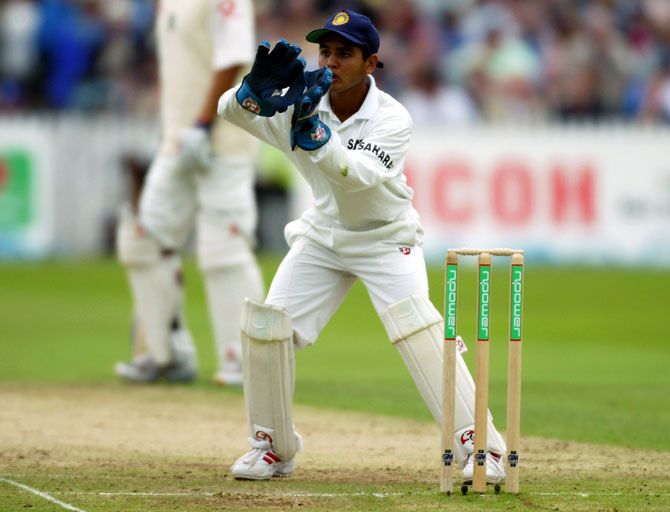
That innings was praiseworthy because till that point you hadn't even played the Ranji Trophy; in fact, you made your Ranji debut two years after your Test debut.
You faced a quality England pace attack in your first Test. How tough was it?
I had played pace before. I had not played Ranji Trophy before, but I had gone on two tours with India 'A' to South Africa and Sri Lanka, where I played against Nantie Hayward, Andre Nel and Pramodya Wickramasinghe. So I had faced that kind of pace before.
But England's attack had pace and swing with bowlers like Matthew Hoggard, Steve Harmison; it was different obviously.
The level of bowling was completely different. It was a big jump for me, but I am glad that I could perform and contribute.
You played a couple of good knocks in Pakistan during the 2004 tour, as India won the series 2-1.
How special was it being part of the first Indian team to win a Test match and a Test series in Pakistan?
It was a great experience. Playing against Pakistan is always special.
I scored 62 not out in the Lahore Test and made 69 when I was asked to open the innings in Rawalpindi.
Shoaib Akhtar and Mohammed Sami were bowling quick; that was genuine pace which I faced for the first time in my career.
They were bowling really quick, around the 150 kmph mark, so it was memorable to take on the challenge of opening the innings and scoring 69 in the third Test and playing my part as the wicket-keeper.
It was really special to be part of the team which won India's first-ever Test series in Pakistan.
During the lockdown, I see everyone is posting throwback pictures and one of the famous ones is of our team celebrating with the trophy after winning the series in Pakistan.
That always reminds me of how important that series was, especially making an important contribution in the historic victory for India.
Whenever I look back at my career, at that series, I feel great.
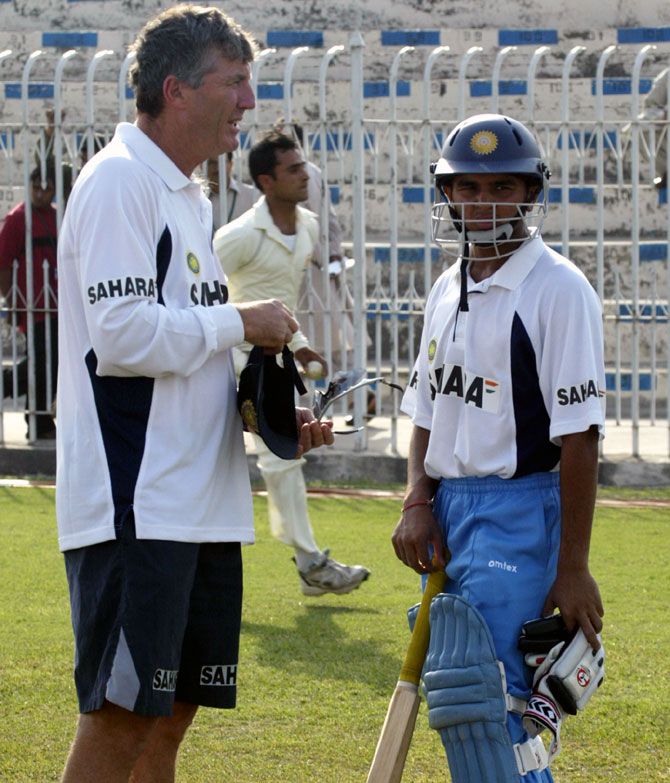
Your first few years in the Indian team were under John Wright, India's first foreign coach.
What sort of a coach was he? How did he help you settle in the team when you came first in so young?
He was always helpful.
I remember the first time we had a practice session at Lord's. He took me aside and said 'I have heard good things about you'. He had not seen me play.
He told me 'Just go out there and enjoy playing for India and learn from this experience. We have some great players in this team, so just learn from them and have fun.'
He was quite chilled out when the game was on. He was very keen on fitness and the first thing he told me was to work on my fitness.
He helped me, being a left-hander, how to face different bowlers and also from different angles.
John helped me a lot through the years. I still stay in touch with him. My relationship with him is still strong; I still talk to him on the phone.
I am glad that I had someone like him at that stage; he was a mentor for me when I made my debut at 17.
Even today if he sees something in my game, he messages me. So it is good to have someone like him.
In your second Test series, a couple of months after making your debut, you faced the tough task of keeping wickets against Anil Kumble and Harbhajan Singh in the home Test series against the West Indies.
How tough a challenge was it for someone so inexperienced to keep against the two great spinners bowling in tandem?
It was a big challenge for sure, because Anil bhai and Harbhajan were at their peak.
Their speed was faster than the normal spinners, but more than the speed the biggest challenge was the bounce which they were generating, especially when playing in Chennai and Mumbai.
So that was a very big challenge. I thought I kept really well throughout that Test series.
I had worked on my wicket-keeping skills before that series with Kiran More.
I did a bit of rubber ball keeping on a cement wicket so that I get slightly more bounce and slightly more pace also. More than the pace it was the bounce and speed they were generating that proved to be a big challenge.
Zaheer Khan and Javagal Srinath were playing, so that was a big challenge too. There isn't much of bounce and the ball comes at a good pace.
You have to stand slightly closer to the stumps than you stand when playing outside India. So that was something I learned, as to where to stand behind the stumps when the ball is reverse swinging.
Javagal Srinath and Zaheer Khan were so effective in Indian conditions on the slow pitches, be it with the new ball or old ball. How was it keeping against them?
Zaheer was the best bowler when it came to setting up the batsman.
You know where he is trying to get a batsman out; he always had a plan ready.
And obviously, there was reverse swing. He knew how to bowl and where to bowl on different wickets.
Sribhai (Srinath) was playing in his last series; he did not play any Tests after that.
Even in his last series, he was getting a lot of bounce and at a very good pace. He was also very accurate.
People talk about Glenn McGrath, but the first time I kept against Sribhai he was right there and there about all the time and with good pace and bounce.
Did keeping against such quality bowlers early in your career help improve your batting?
It does. Batting is something which has come very naturally to me.
I loved batting, especially growing up on matting wickets in Gujarat helped me a lot.
I am talking about when I started. I was nine years old, in 1994-1995. There were hardly any turf wickets in Ahmedabad, so we used to play on matting wickets.
Generally, the pace and bounce would be more than turf wickets, so matting wickets helped me a lot playing pace.
Even though your gritty batting earned lot of praise, your wicket-keeping came in for some criticism. Was it tough to deal with it at that young age?
Honestly, I did not have a couple of good series behind the stumps and got dropped. It was the right decision.
When you are playing for India you are supposed to be on your toes all the time.
Obviously, my wicket-keeping came under the scanner, and rightly so at that time.
There are no regrets as to why people jumped on me or why only me. It was never the thing on my mind; the only thought was where can I go from here and how can I improve as a wicket-keeper. That has always been the case.
If I look at myself now, hardly anyone can get a chance to play for the country at 17, 18 or 19.
There are no regrets and I am very happy at where I am at this point of time in my career.
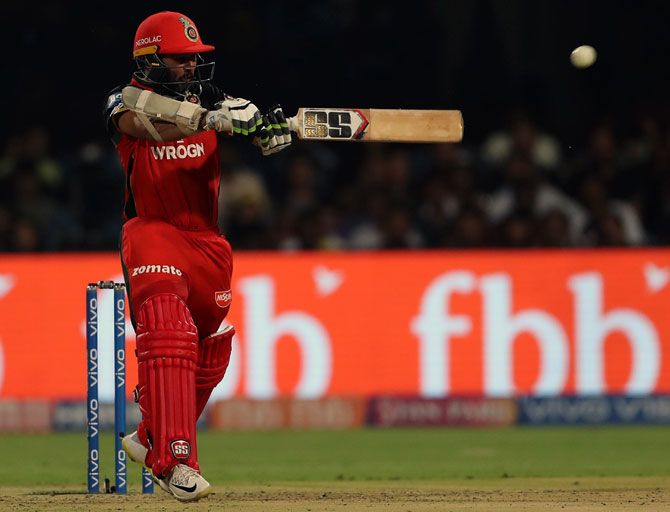
Then came the Mahendra Singh Dhoni era, when wicke-tkeepers had no hope of making it to the team, no matter how well they performed.
How did you motivate yourself during those times when you knew no matter what you did it was impossible to get back into the team?
You had to accept the fact and accept the present situation; there was no running away from it.
At that point of time, the situation was that Dhoni was the captain and everyone else was battling for the second wicket-keeper's slot.
I had accepted it. After getting dropped I decided to set myself a certain standard, set myself a certain amount of intensity with which I would play my cricket.
Be it club cricket, be it Ranji Trophy, be it district cricket, be it the IPL or whatever level it is, I was going to play with a certain amount of intensity. I was going to enjoy it, the level didn't matter to me.
For me, it was about playing cricket. That is the reason for my longevity, the reason why I could keep myself fit.
I was fighting with myself, always thinking of improving my game, getting better personally, not comparing myself with anyone else.
Did you go back to the basics as far as your wicket-keeping was concerned? Whom did you work with to improve your glovework?
As far as 'keeping is concerned, I have been always been consulting with Kiran More. I talk a lot with him.
Every time I need some technical advice, I go to him.
I decided to do a lot of drills, put in hours behind my 'keeping.
I changed my schedule of practice: I used to do both, wicket-keeping and batting, both in one session. I decided to do just batting in one session and then take a break for three to four hours and come back and do wicket-keeping. That way I could justify both jobs.
That was the thought behind my improvement in both skills and the change of mindset.
I used to think, and no matter where I am batting, I am a pure batsman in the side, so my contribution has to be like a pure batsman and not like someone who is a wicket-keeper-batsman.
And when I am wicket-keeping, it is hundred percent a wicket-keeper's job; it doesn't matter whether I have scored a hundred in the game, I still have to make sure that I am taking all the catches.
So the change of mindset and change of schedule made a huge difference to my game.
- Also read: Why Jasprit Bumrah is So Special
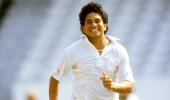


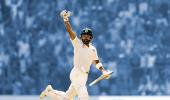








 © 2025
© 2025